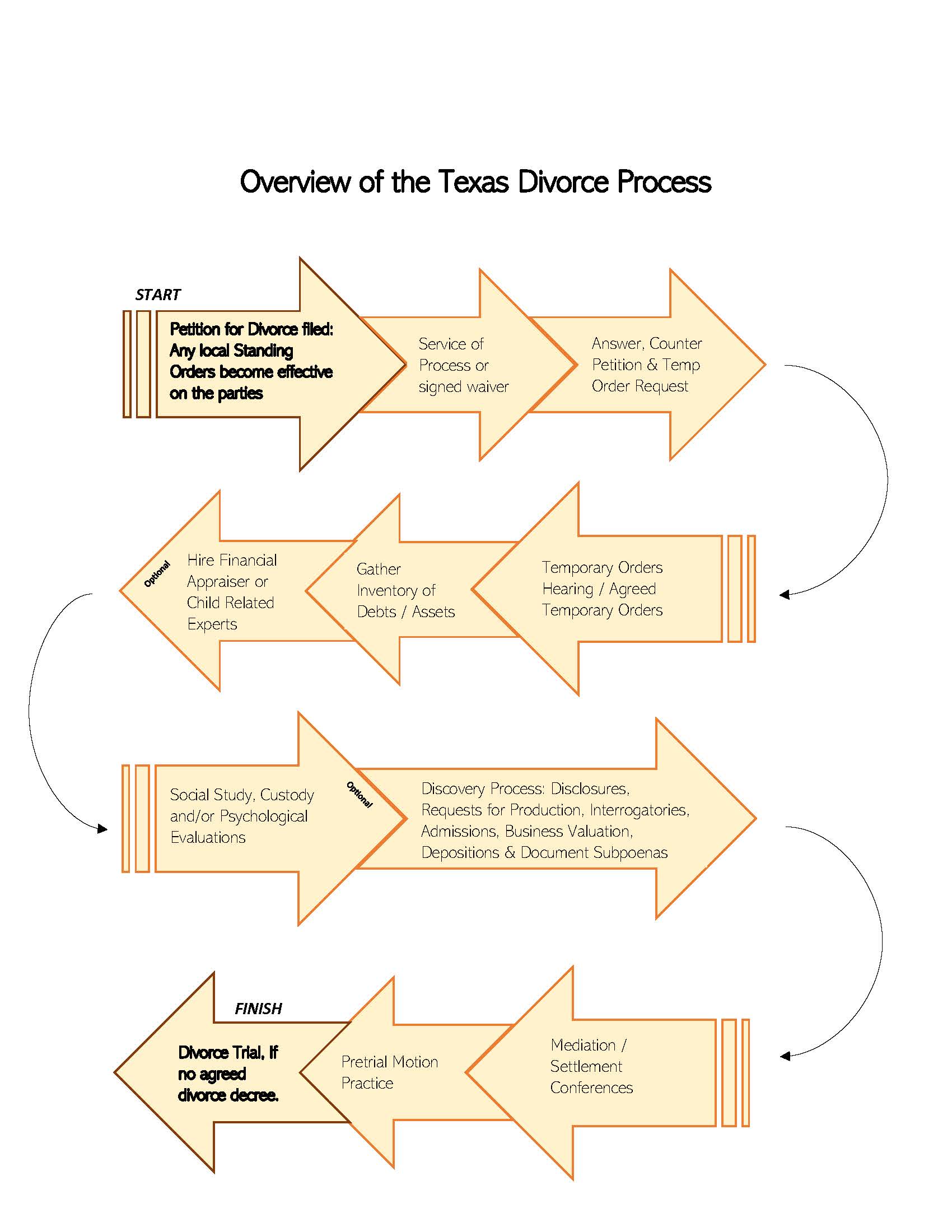OVERVIEW OF THE DIVORCE
PROCESS IN TEXAS
The divorce process begins with the filing of a petition for divorce and if the divorcing parties cannot agree on all issues, those remaining issues are presented to a judge for a final determination.
THE TEXAS DIVORCE PROCESS
Aggressive Dallas Divorce Attorney
Our Dallas divorce attorneys have represented clients in hundreds of cases, from simple undisputed divorces to the most complex and difficult matter. A successful family law case often begins with a strong assertive offense and/or defense, and you need a lawyer capable of being assertive when and as necessary. Our Dallas divorce lawyers will not allow you to be taken advantage of but will strive to protect your rights, to fight for your interests, and to give you the strong and aggressive representation your case demands.
Family Law Resources & Services
Need any help?
Family Law Resources
- Abandonment and Divorce
- Acceptance of Benefits
- Adultery and Separation
- Annulment in Texas
- Attorneys Fees in Divorce
- Breached Settlement
- Business Valuations
- Causes of Divorce in Texas
- Characterizing and Tracing Property in Texas
- Common Clauses in Prenuptial Agreements
- Community Property in Divorce
- Compensation in Divorce
- Complex Property Division
- Contested Divorce in Texas
- Debt Division in Divorce
- Default Divorce in Texas
- Discretion in Divorce Cases
- Dividing Investment and Bank Accounts in Divorces
- Dividing IRAs/401ks/Pensions in Divorce
- Dividing Overseas Property in Texas
- Dividing Real Estate In Texas Divorce
- Division of Retirement Funds in Divorce
Additional Texas Divorce Focus
What Is Spousal Maintenance In Texas?
Spousal maintenance is a statutory remedy created by the Texas legislature that allows for a court to award payments to a spouse after divorce for a brief period of time under very limited circumstances. The legal remedy of spousal maintenance is codified in Chapter 8 of the Texas Family Code. A court that determines that a spouse is eligible to receive maintenance shall determine the nature, amount, duration, and manner of periodic payments by considering all relevant factors, including:
- each spouse's ability to provide for that spouse's minimum reasonable needs independently, considering that spouse's financial resources on dissolution of the marriage;
- the education and employment skills of the spouses, the time necessary to acquire sufficient education or training to enable the spouse seeking maintenance to earn sufficient income, and the availability and feasibility of that education or training;
- the duration of the marriage;
- the age, employment history, earning ability, and physical and emotional condition of the spouse seeking maintenance;
- the effect on each spouse's ability to provide for that spouse's minimum reasonable needs while providing periodic child support payments or maintenance, if applicable;
- acts by either spouse resulting in excessive or abnormal expenditures or destruction, concealment, or fraudulent disposition of community property, joint tenancy, or other property held in common;
- the contribution by one spouse to the education, training, or increased earning power of the other spouse;
- the property brought to the marriage by either spouse;
- the contribution of a spouse as homemaker;
- marital misconduct, including adultery and cruel treatment, by either spouse during the marriage; and
- any history or pattern of family violence, as defined by Section 71.004.
Spousal maintenance payments ordered under Chapter 8 of the Texas Family Code are enforceable by contempt and may be subject to a wage withholding order issued to the paying spouse’s employer.
What Is Contractual Alimony In Texas?
Contractual alimony is a voluntary payment of spousal maintenance from one spousal to another spouse. A person going through divorce may agree to make regular payments to the other spouse as contractual alimony as part of the property settlement. There may be variety of reasons entering into such a voluntary spousal agreement, but it is most often used to equalize the division of marital property while providing one spouse with a steady income stream.
For more information on how to file a divorce in Texas visit the following link: Filing a Texas Divorce
CLIENT MATTERS
5,000+
YEARS OF SERVICE
25+
Award Winning
Recognized in the legal industry as dedicated board-certified lawyers and Rising Stars.
Expert Team
Your project will be handled by legal experts every time. You will have the most experienced attorneys working for you.
Quality Representation


Let's talk about your legal issue
Wilson Legal Group P.C.
d/b/a Wilson Whitaker Rynell
(972) 248-8080 (Dallas) MAIN OFFICE
(713) 830-2207 (Houston) Appointment Only
(512) 691-4100 (Austin) Appointment Only
For more information on how we can assist in your intellectual property, commercial litigation, divorce, or other personal needs, let us know how we can help you:
How Can We Help You?
WILSON WHITAKER RYNELL
Thank You for Contacting Us!
Your information has been sent, and we will contact you shorlty...issues.
WILSON WHITAKER RYNELL
Oops, there was an error sending your message.
Please try again later.
Disclaimer:
This form does not establish an attorney-client relationship, and should only be used to contact the firm about scheduling a call or meeting. No confidential or sensitive information should be sent using this form.
The law office of Wilson Legal Group P.C. (d/b/a Wilson Whitaker Rynell) represents clients nationwide, including Dallas, Austin, Houston, and other Texas areas such as Fort Worth, Arlington, Carrollton, Plano, Allen, Lewisville, Flower Mound, Irving, Denton, McKinney, North Richland Hills, and all cities within Dallas County, Tarrant County, Collin County, and Denton County.
OFFICES
ABOUT
CONTACT
BLOG
Wilson Whitaker Rynell
16610 Dallas Parkway, Suite 1000
Dallas, Texas 75248
972-248-8080 (MAIN)
972-248-8088 (FAX)
info@wrrlegal.com (E-MAIL)










